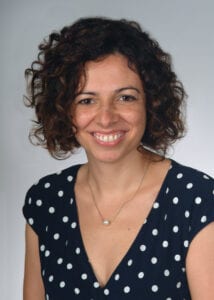
Posted By: Evelyn Mantegani, Senior Specialist, Marketing and Communications, ASHG
Paula Ramos, PhD is an Assistant Professor at the Medical University of South Carolina in Charleston, South Carolina. Her research is aimed at understanding the genetic etiology of human autoimmunity and the reasons underlying its ethnic disparities. Her experience as a human geneticist spans the areas of molecular, statistical, and population genetics, bioinformatics and genetic epidemiology. Her research is focused on the identification of disease-associated genetic and epigenetic risk factors, focusing on systemic lupus erythematosus (SLE) and systemic sclerosis (SSc), mostly in African Americans.
She is also a member of the GENE Network, co-teaches and co-directs a Human Genetics and Genomics course, and is a member of the Sea Island Families Project Citizen Advisory Committee in South Carolina, her institution’s academic-community partnership. She enjoys being involved in education and increasing the genetic literacy of both students and colleagues in academia, as well her patients and the community. As a long-time DNA Day Essay Contest judge, ASHG spoke to her about her experience volunteering each year, why she continues to volunteer, and what she wants people to know about human genetics and genomics.
ASHG: When did you first volunteer to judge the DNA Day Essay Contest and for how many years have you volunteered?
Dr. Ramos: I first volunteered and judged essays in 2014, and just volunteered for the seventh time this year.
ASHG: What made you first volunteer to judge and what makes you continue?
Dr. Ramos: I wish to both give back and to help support my favorite field of research, human genetics and genomics. I feel that judging the essays is a way to support the mission of the ASHG to advance human genetics and genomics by nurturing the next generation’s understanding and interest in human genetics.
ASHG: Which round do you typically volunteer for and about how much time does it take you?
Dr. Ramos: I didn’t have a preference for years and judged mostly second round essays. Last year I judged first round essays. Either round takes me a few hours and can be done in one morning or one afternoon. I did feel that it was easier to judge the first round, since one can easily identify the poorer quality essays. Judging the second round requires more care, but it can also be surprisingly rewarding to see the thought process and level of quality of some essays.
ASHG: What would you tell someone who is deciding to volunteer as a judge?
Dr. Ramos: It is an easy way to show your care about human genetics and about fostering curiosity and interest in human genetics in the next generation.
ASHG: What is the best memory you have of one of your educators when you were a student?
Dr. Ramos: I have the fondest memories of Dr. Richard King while in graduate school, his Advanced Human Genetics course, and the conversations with him. Each class I felt like Sherlock Holmes, trying to figure out a puzzling human genetics mystery. I remember the feeling of awe in every class, and literally fell in love with the complexity and mystery of our genome. Despite his renown, I was also profoundly touched by how humble Dr. King was. He was so accessible, always encouraged critical thought, and brought in the big picture and the purpose of research. By acknowledging how little we know and understand about our genome, he fostered a fascination for its enigmas, and a desire to decipher them. By telling real stories of patients, he fostered an aspiration to advance knowledge to improve health. He was definitely one of the most inspiring educators I had.
ASHG: What is one thing you want people to know about human genetics and genomics?
Dr. Ramos: I would like for people to appreciate that human genetics and genomics is a complex and fascinating field, to be aware that it can be prone to misunderstandings and has been used to justify abuses, and to recognize that, with care and responsibility, it holds tremendous potential to help everyone’s health. In the past decade I’ve seen unprecedented scientific and social progress in human genetics and genomics, and couldn’t feel more hopeful and optimistic about a future where we all benefit from its progress.
To volunteer to judge the 2021 DNA Day Essay Contest, visit the ASHG DNA Day Essay Contest page.
